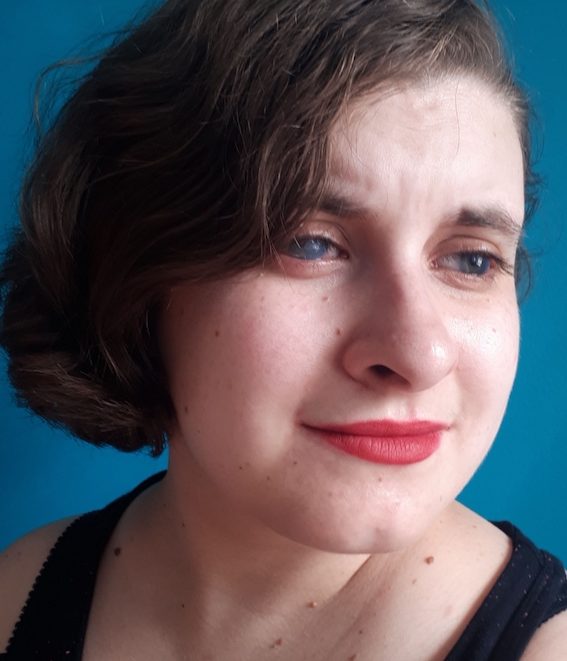
To celebrate the release of our Summer issue 57.4, we asked contributor Marika Prokosh to spill the tea on her poem “Letter from Voyager 2,” which appears in the issue alongside the equally brilliant poem, “Inheritance.”
When I was small, my mother played us the Classical Kids cassettes to break up the endless acoustic versus of “The Ants Go Marching” and “There’s a Hole in the Bottom of the Sea” we demanded. Mr Bach Comes to Call opened with an unexpectedly sublime description of the Voyager space probe’s 1977 launch and contents, including “greetings in 54 languages, 117 different pictures of the planet Earth, a drawing of a man and a woman, sounds of whales, wind, rain, elephants, avalanches, birds, fires, crickets, wild dogs, herding sheep, ships, trains, frogs, volcanoes, mothers, children, a kiss, and music. Twenty-seven pieces of the best music from all over the world” (including three pieces by Mr Bach himself), all of them “still in space with the stars.” I imagined Voyager as a sort of ghost library in space crossed with a message in a bottle. It’s not unlike how I came to think about writing a poem: a collection of sounds and images that together say in a wholly incomplete way, I was here. This is what I thought about.
Two years ago, this astronomical vertigo came rushing back as I stood at my sink washing dishes while As It Happens aired an old Radiolab interview with Ann Druyan about compiling the contents of the Voyager probes. All this time there had been two, sent in opposite directions, now both well past the solar system where we reside, both containing recordings, along with the Bach and the Blind Willie Johnson, of her brainwaves and heartbeats in the early days of her romantic relationship with Carl Sagan. Two bottles full of Earth, hurled into a forking river.
The next week I sat in Winnipeg’s Good Will Social Club with a beer and tried unsuccessfully to work out the existential terror this image gave me. In Montreal a few months later, I joked to my friend Jon that I was trying to write a hookup poem about Voyager, conjuring a probe in a sparse dim dive bar, to which he drily replied that Voyager had been failing to pick up Space in a bar for 40 years. This made me laugh, then tightened my chest. Months later I walked through St Peter’s Abbey in Saskatchewan with my friend and mentor Sandra, telling her about Voyager while she told me about the spiders that use Earth’s electro field to drift through the air on silk balloons. None of my poem balloons were catching air.
In the end, I think it was Karen Solie’s poem “Double” that got me the rest of the way there. My already impaired eyesight was getting worse, I felt bereft of “someone to talk with. / To whom this strange soft snow falling / out of the blue, for example, might be / described, that thought defined,” and like my spirit was “setting out alone / each night to wander freeways’ dangerous / collectors.” The poem took on the shape of a love letter to that impossible twin as a proxy for those scattered at the edge of the solar system, in isolation due to loneliness, illness, grief, and other places where one breaks down, where it is hard to receive messages from Earth, stuck between the loving tether to one’s old place and gracefully accepting the possibilities of current conditions, tender memories, and future trajectories.
Letter from Voyager 2
By Marika Prokosh
I want to tell you about the weather
at the outer edge of the solar system:
the wind! The heat! Darling,
we are farther than known entities
from our blue marble have ever been. At night,
which is all the time, I stroke
the grooves in my records, unable to conjure
rain or raise Beethoven from the dead.
Do you remember what a human body looks like
in motion? The nuances of hand and eye
in conversation over a softball and gravity?
It’s so dark now. My generators are shutting down.
Camera: disabled, radio: disabled, spectrometer:
you get the picture. We were never meant to last,
but what does human lifespan mean past
the heliosheath? I murmur into my tape recorder
as though it’s going to find you,
like one day we’ll sit side by side in the Florida sun
on deck chairs, comparing notes on the ice giants.
Thinking about it, I want to lick them, thirst
for their confectioner’s colours. I imagine
astronauts driving around and around the block
in the old neighbourhood, peering in windows,
but my love, out here we are the most alien
thing in the universe, hitchhiking remote highways
alone, hoping for a hookup, groping for new
planetary energetic particles. I don’t know if I believe
in anyone else. Soon, any discoveries
to the contrary will just happen. It doesn’t matter
if no one retrieves the dead light we saw
and now pass by unseeing, or measures
plasma in the strange clouds we traverse.
I tell myself: it is enough to play Dark Was the Night,
Cold Was the Ground and fumble toward Andromeda,
dreaming of other worlds while we can.
Marika Prokosh writes, cooks, and answers reference questions in Winnipeg. Her poetry has appeared in Prairie Fire, CV2, Room, Lemon Hound, QDA: A Queer Disability Anthology, and at The Toast, where she also wrote the monthly advice column, “The Spinster’s Almanac.”